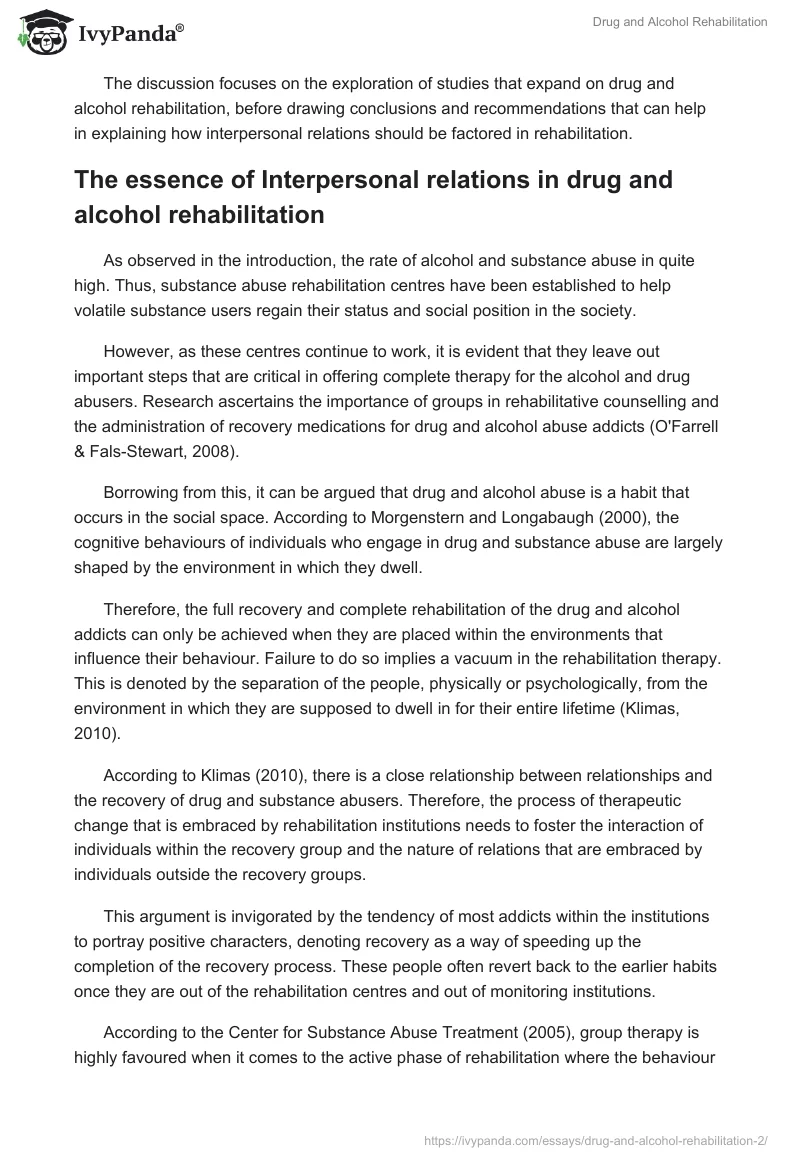Drug Rehabilitation - Truths
Wiki Article
Drug Rehabilitation Can Be Fun For Everyone
Table of ContentsThe Best Strategy To Use For Drug RehabilitationOur Drug Rehabilitation IdeasThings about Drug RehabilitationIndicators on Drug Rehabilitation You Should KnowThe 9-Second Trick For Drug Rehabilitation
This includes addressing the entire person to guarantee that every one of the underlying domino effects of the dependency are appropriately cared for and corrected. This gives people the tools they need for a full go back to a satisfied, healthy, substance-free life. Drug dependency "therapy" is a little a misleading term it suggests that people with addictions are "all much better" after they have gotten some kind of therapy.Even individuals with years of effective recuperation must remain mindful of their possibility for relapse, and they need to use the devices they learned in therapy to prevent it. Words "recovery" likewise implies that a person is being corrected after misbehaving, which follows culture's preconception about dependency. Drug Rehabilitation. Component of the recovery process is for people with dependencies, and their households, to find out that dependency refers biology and not principles
Transitioning from physical and psychological addiction to a healthy and delighted way of living is a big change. It is necessary that the steps to medication rehabilitation be appropriately resolved during the drug rehab procedure. There are 4 phases of addiction recuperation: Addiction analysis is an especially critical part of the rehabilitation process.
This is part of the underlying psychology of dependency, and it reinforced by anxieties of apprehension for ownership and judgment from family members and buddies. The assessment process requires getting trust and breaking with that deceptive nature. The individual requirements to recognize which materials were made use of and the degree of their substance usage.
Not known Facts About Drug Rehabilitation

For lots of people with dependencies, anxiety of withdrawal is a significant barrier to escaping their addiction, and that fear maintains them from even attempting. Fortunately, withdrawal and medication detoxification do not have to be a terrible experience. By joining a medical detoxification program, individuals can make it through the experience securely and comfortably.
For a lot of people with compound addiction, their material usage is no much longer about obtaining high. Drug rehabilitation is the process where the deep issues around the dependency are determined and dealt with.
6 Simple Techniques For Drug Rehabilitation
Rather, it can be stated that rehab is the procedure of exploration, while what occurs afterward is healing. The addicted mind usually begins to think especially after a duration of time in abstinence that it is alright to attempt drinking or utilizing compounds again. This seldom functions, and the huge majority of people who attempt drinking or utilizing medicines once again browse around this web-site will quickly end up where they were before.
Sober living residences are an especially efficient approach to aftercare when an individual is discharged from rehab. People and their family members should talk about these alternatives with their therapists while still in rehab. There are different kinds of treatment for addiction, based upon the degree of treatment offered. When selecting the degree of treatment, the selection needs to be based upon what will provide the content specific the very best opportunity of success in recuperation not on what the private wishes to do.
This is a bad combination, as it drives lots of people to believe that they can quit using drugs or alcohol consumption on their own. They may be hesitant to see and confess that they need a greater degree of treatment, such as inpatient rehab. Detoxing from a compound is not the exact same as therapy for material dependency.
10 Easy Facts About Drug Rehabilitation Explained
, people's minds are muddled and they feel physically and psychologically ill. They are not receptive to any kind of counseling or therapy until their minds clear and they are feeling much better.Like inpatient therapy, domestic treatment uses the restorative impact of eliminating individuals from their dysfunctional way of life and environment and putting them in secure, healthy surroundings. This enables them to reorient their lives and thought procedures while focusing on distraction-free recuperation. Residential rehab varies from inpatient rehabilitation (Drug Rehabilitation) in that it is done in a facility outside of the hospital system and generally entails a much longer remain.
Individuals receive restorative services on-site throughout the day, however go home or to a sober living facility at evening. The strength of the daytime therapy will certainly depend on private requirements and the programs Get More Information available at the outpatient center. Most people with significant dependency will likely have much better results in inpatient therapy and rehabilitation.
Not known Facts About Drug Rehabilitation
Long-lasting domestic treatment programs typically use a healing approach understood as the restorative area (TC). This is a technique to re-socializing individuals whose addiction has seriously influenced their ability to fit into society. These consist of people with significant criminal actions, people who are homeless, teenagers and individuals with major psychological wellness disorders.Report this wiki page